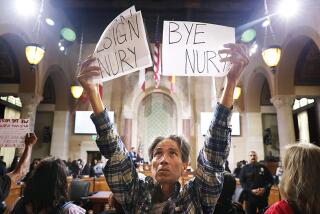The Plame blame game
- Share via
THE VALERIE PLAME AFFAIR, which once seemed like a political morality play, has morphed into a dark comedy of errors. One more scene remains to be enacted -- the criminal trial of I. Lewis “Scooter” Libby, a former aide to Vice President Dick Cheney -- but it would have been better for all concerned if the curtain had been brought down on this drama long ago.
Last week it was revealed that former Deputy Secretary of State Richard L. Armitage, not a White House political operative, was Robert Novak’s primary source for his now infamous July 2003 syndicated column about a fact-finding mission to Africa by former Ambassador Joseph C. Wilson IV. In that column Novak cited “two administration officials” who had told him that Wilson’s wife, a CIA operative named Valerie Plame, had suggested sending Wilson to Niger to determine if that nation had supplied uranium to Saddam Hussein.
Wilson complained that this “outing” of his wife was retaliation for an Op-Ed column he wrote casting doubt on the Niger-Iraq connection, which despite Wilson’s skepticism found its way into President Bush’s 2003 State of the Union address.
Critics jumped -- it wasn’t much of a jump, given the administration’s sensitivity to criticism -- to the conclusion that the exposure of Plame was carefully plotted at the highest levels. The plot thickened when special prosecutor Patrick J. Fitzgerald launched a criminal investigation, bringing Libby and Bush political advisor Karl Rove before a federal grand jury. Eventually, Libby was indicted on charges that he misled the FBI and the grand jury about conversations he had with reporters about Plame.
Libby is facing trial, and Wilson and Plame can continue to argue that there was a coordinated effort to impugn him by bringing her into the controversy over Niger and uranium. But the disclosure that it was Armitage who mentioned Plame’s role to Novak -- before Rove confirmed it -- muddies the story line of a malicious outing of a covert agent. What’s more, it seems that Fitzgerald knew of Armitage’s role before he initiated the elaborate investigation that eventually resulted in not only the Libby indictment but also the jailing of former New York Times reporter Judith Miller, who had refused to reveal her sources.
Some supporters of the administration are gloating over the disclosure of Armitage’s role, suggesting that it shows Fitzgerald was on a witch hunt. Some are demanding a presidential pardon for Libby. That’s premature, and it’s worth recalling that Libby is accused of something serious: lying to federal investigators. Still, the latest twists and turns in the Plame-Wilson affair make us wish that we had been right when we observed, almost exactly three years ago, that “no one should count on catching the leaker, at least in a legally airtight manner.”
More to Read
Sign up for Essential California
The most important California stories and recommendations in your inbox every morning.
You may occasionally receive promotional content from the Los Angeles Times.








